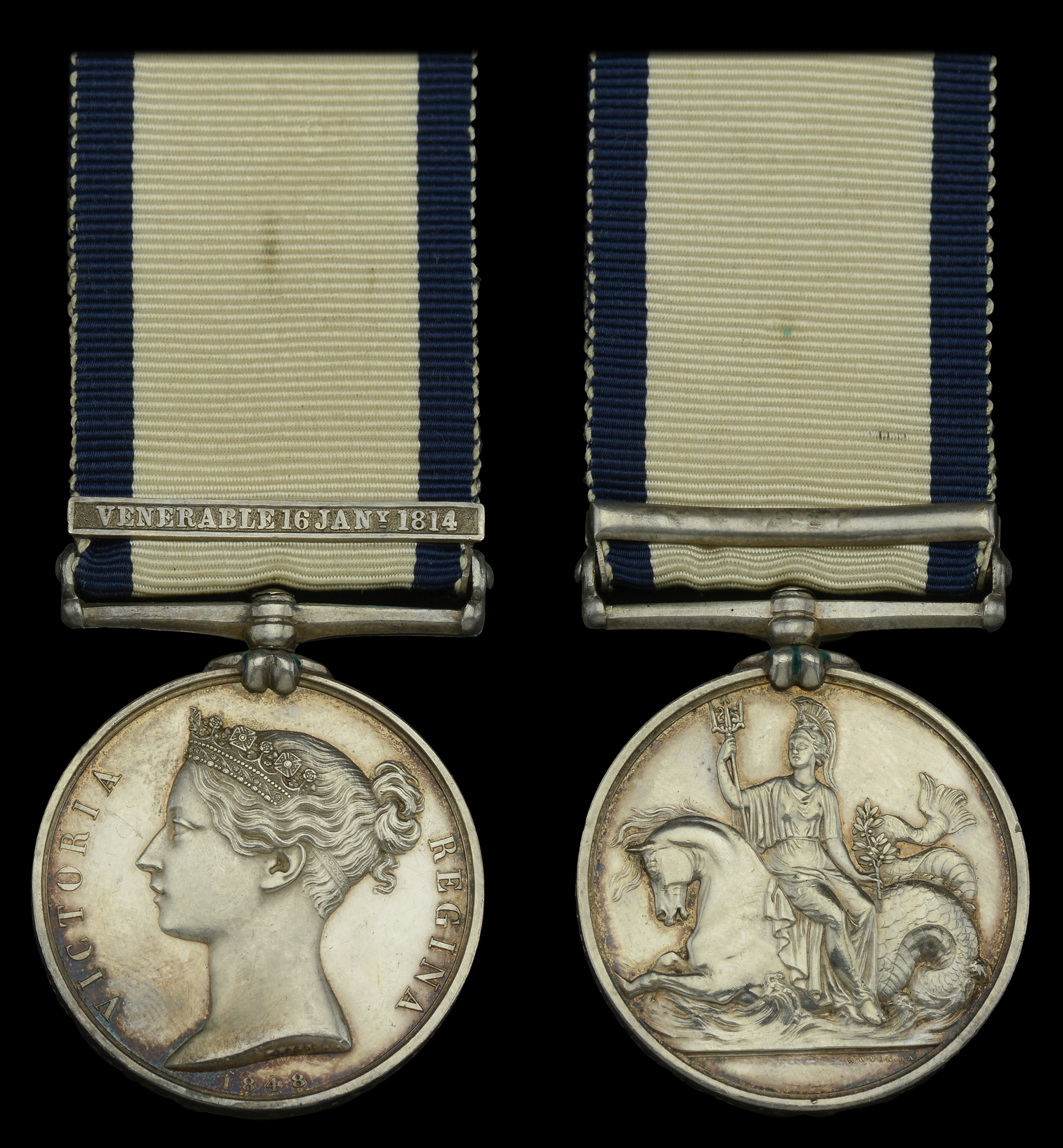The Naval General Service medal awarded to Lieutenant David Briggs, Royal Navy, for his services as Master’s Mate of the Venerable at the capture of two French frigates in January 1814 Naval General Service 1793-1840, 1 clasp, Venerable 16 Jany 1814 (David Briggs, Master’s Mate.) extremely fine £5,000-£7,000 --- Importation Duty This lot is subject to importation duty of 5% on the hammer price unless exported outside the UK --- --- Provenance: Glendining’s, October 1949 and June 1952; Peter Dale Collection, July 2000. 42 clasps issued for Venerable 16 Jany 1814. The Venerable and Cyane with two French frigates, 16 and 20 January 1814 ‘On January 16th, about seven in the morning, the seventy-four gun ship Venerable, Captain J. A. Worth, with the flag of Rear-Admiral P. C. Durham, on his way to take the chief command at the Leeward Islands, the Cyane, twenty-two gun sloop, Captain J. Forrest, and the brig Jason, a French prize captured some days before, in charge of Lieutenant Moffat, and twenty-two men of the Venerable; fell in, near the Canary Islands, with the French frigates Alcméne and Iphigénia, forty guns each, from Cherbourg, on a cruise. The Cyane having found that the two ships were enemies, informed the Venerable by signal, which immediately went in chase, and by the superiority of her sailing, at about six in the evening arrived within hail of the Alcméne, the sternmost frigate. To a summons to surrender, the Alcméne hoisted her colours and fired a broadside at the Venerable, which was returned, when the French frigate suddenly bore up under all sail in the smoke, and ran straight on board the seventy-four, expecting that her consort, in accordance with a pre-concerted arrangement, would second her bold attempt. The frigate was instantly lashed alongside, and Captain Worth with a hundred boarders sprang on her deck, and after a sharp conflict of fifteen minutes, hauled down her colours. The Iphigénia hauled sharp up and stood away, leaving the Alcméne to her fate. Out of her crew of three hundred and nineteen men and boys, she had thirty-two men killed, and fifty officers and men wounded, including her commander. The loss of the Venerable was two men killed and four wounded. Meanwhile, the Cyane and Jason, the latter having but two guns on board, continued the chase of the flying Iphigénia, and at ten p.m., the brig, having outsailed the Cyane, opened on the frigate, but finding her guns in reply too heavy, abandoned the contest. An hour or two after the Cyane came up near enough to use her bow guns, and continued exchanging shots with the enemy till nearly five o'clock the next morning, when the Iphigénia hauled up and fired three broadsides at the sloop, which finding she was over-matched, dropped astern, but still endeavoured to keep the chase in sight. Thus passed the remainder of that day, and the whole of the next, and the day after, August 18th and 19th, when the Cyane lost sight of the object of her pursuit. During this time, the Venerable having removed the prisoners, secured her prize, and repaired her damages, was fast coming up under a press of sail, steering to the north west. At daybreak on the morning of August 20th, the Venerable was within two miles of the Iphigénia, but from her mast head the Cyane was not to be seen. At eight a.m. after a running fight, and having thrown her boats overboard, and cut away her anchors without effect, the French frigate fired a broadside, and struck her colours. Neither of the ships sustained any loss, and the Cyane also escaped without any casualties. The prizes being nearly new ships, were added to the British Navy, the Alcméne as the Gloire, and the Iphigénia as the Dunira, which name was afterwards changed to the Immortalité.’ (Medals of the British Navy by W. H. Long refers). David Briggs entered the Navy on 21 March 1806, as First-class Volunteer, on board the Renown 74, Captain Philip Charles Durham. He attained the rating of Midshipman in October following and, after serving for upwards of four years off L’Orient, and in blockading the Rochefort and Toulon squadrons, was paid off 28 March 1810. He joined, in August of the same year, the Armada 74, Captain Adam M‘Kenzie, employed off Cadiz and in the North Sea. He removed, as Master’s Mate, in November 1811, to the Hannibal 74, flag-ship off the Texel of his former Captain, Rear-Admiral Durham. He was discharged, in February 1812, into the Christian VII 74, Captains Thomas Browne and Henry Lidgbird Ball. Having passed his examination in March following, he rejoined the Rear-Admiral, soon afterwards, in the Bulwark 74, and, while subsequently proceeding with him to the West Indies, in the Venerable 74, assisted at the capture, off Madeira, by that ship and the Cyane sloop, of the French 44-gun frigates Iphigénie and Alcmène, 16 and 20 January 1814. On 28 of the ensuing month Mr. Briggs became Acting-Lieutenant of the Fox sloop, Captain Frank Gore Willock, and, on arriving in England, he was officially promoted by commission dated 8 July in the same year. After attending, in 1814-15, as First of the Fox, the expedition to New Orleans, whence he conveyed back to Jamaica part of the 2nd West India Regiment, he returned to the Venerable, 10 August 1815, and came home and was paid off 3 May 1816.





